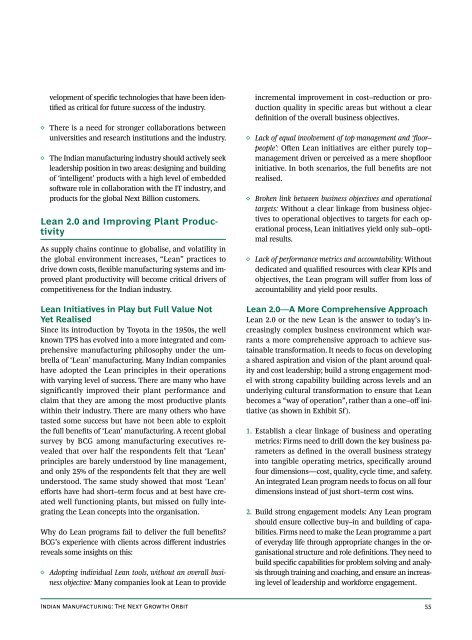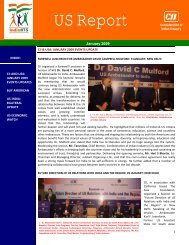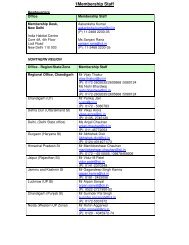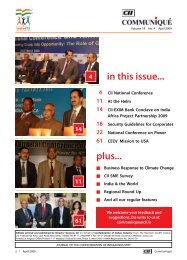A4 Report Template - CII
A4 Report Template - CII
A4 Report Template - CII
Create successful ePaper yourself
Turn your PDF publications into a flip-book with our unique Google optimized e-Paper software.
velopment of specific technologies that have been identifiedas critical for future success of the industry.◊ There is a need for stronger collaborations betweenuniversities and research institutions and the industry.◊ The Indian manufacturing industry should actively seekleadership position in two areas: designing and buildingof ‘intelligent’ products with a high level of embeddedsoftware role in collaboration with the IT industry, andproducts for the global Next Billion customers.Lean 2.0 and Improving Plant ProductivityAs supply chains continue to globalise, and volatility inthe global environment increases, “Lean” practices todrive down costs, flexible manufacturing systems and improvedplant productivity will become critical drivers ofcompetitiveness for the Indian industry.◊◊◊incremental improvement in cost–reduction or productionquality in specific areas but without a cleardefinition of the overall business objectives.Lack of equal involvement of top management and ‘floor–people’: Often Lean initiatives are either purely top–management driven or perceived as a mere shopfloorinitiative. In both scenarios, the full benefits are notrealised.Broken link between business objectives and operationaltargets: Without a clear linkage from business objectivesto operational objectives to targets for each operationalprocess, Lean initiatives yield only sub–optimalresults.Lack of performance metrics and accountability: Withoutdedicated and qualified resources with clear KPIs andobjectives, the Lean program will suffer from loss ofaccountability and yield poor results.Lean Initiatives in Play but Full Value NotYet RealisedSince its introduction by Toyota in the 1950s, the wellknown TPS has evolved into a more integrated and comprehensivemanufacturing philosophy under the umbrellaof ‘Lean’ manufacturing. Many Indian companieshave adopted the Lean principles in their operationswith varying level of success. There are many who havesignificantly improved their plant performance andclaim that they are among the most productive plantswithin their industry. There are many others who havetasted some success but have not been able to exploitthe full benefits of ‘Lean’ manufacturing. A recent globalsurvey by BCG among manufacturing executives revealedthat over half the respondents felt that ‘Lean’principles are barely understood by line management,and only 25% of the respondents felt that they are wellunderstood. The same study showed that most ‘Lean’efforts have had short–term focus and at best have createdwell functioning plants, but missed on fully integratingthe Lean concepts into the organisation.Why do Lean programs fail to deliver the full benefits?BCG’s experience with clients across different industriesreveals some insights on this:◊ Adopting individual Lean tools, without an overall businessobjective: Many companies look at Lean to provideLean 2.0—A More Comprehensive ApproachLean 2.0 or the new Lean is the answer to today’s increasinglycomplex business environment which warrantsa more comprehensive approach to achieve sustainabletransformation. It needs to focus on developinga shared aspiration and vision of the plant around qualityand cost leadership; build a strong engagement modelwith strong capability building across levels and anunderlying cultural transformation to ensure that Leanbecomes a “way of operation”, rather than a one–off initiative(as shown in Exhibit 5f).1. Establish a clear linkage of business and operatingmetrics: Firms need to drill down the key business parametersas defined in the overall business strategyinto tangible operating metrics, specifically aroundfour dimensions—cost, quality, cycle time, and safety.An integrated Lean program needs to focus on all fourdimensions instead of just short–term cost wins.2. Build strong engagement models: Any Lean programshould ensure collective buy–in and building of capabilities.Firms need to make the Lean programme a partof everyday life through appropriate changes in the organisationalstructure and role definitions. They need tobuild specific capabilities for problem solving and analysisthrough training and coaching, and ensure an increasinglevel of leadership and workforce engagement.Indian Manufacturing: The Next Growth Orbit 55
















